Fauci Reflects on Cura Personalis in Patient Care and Public Service at Kovach Lecture
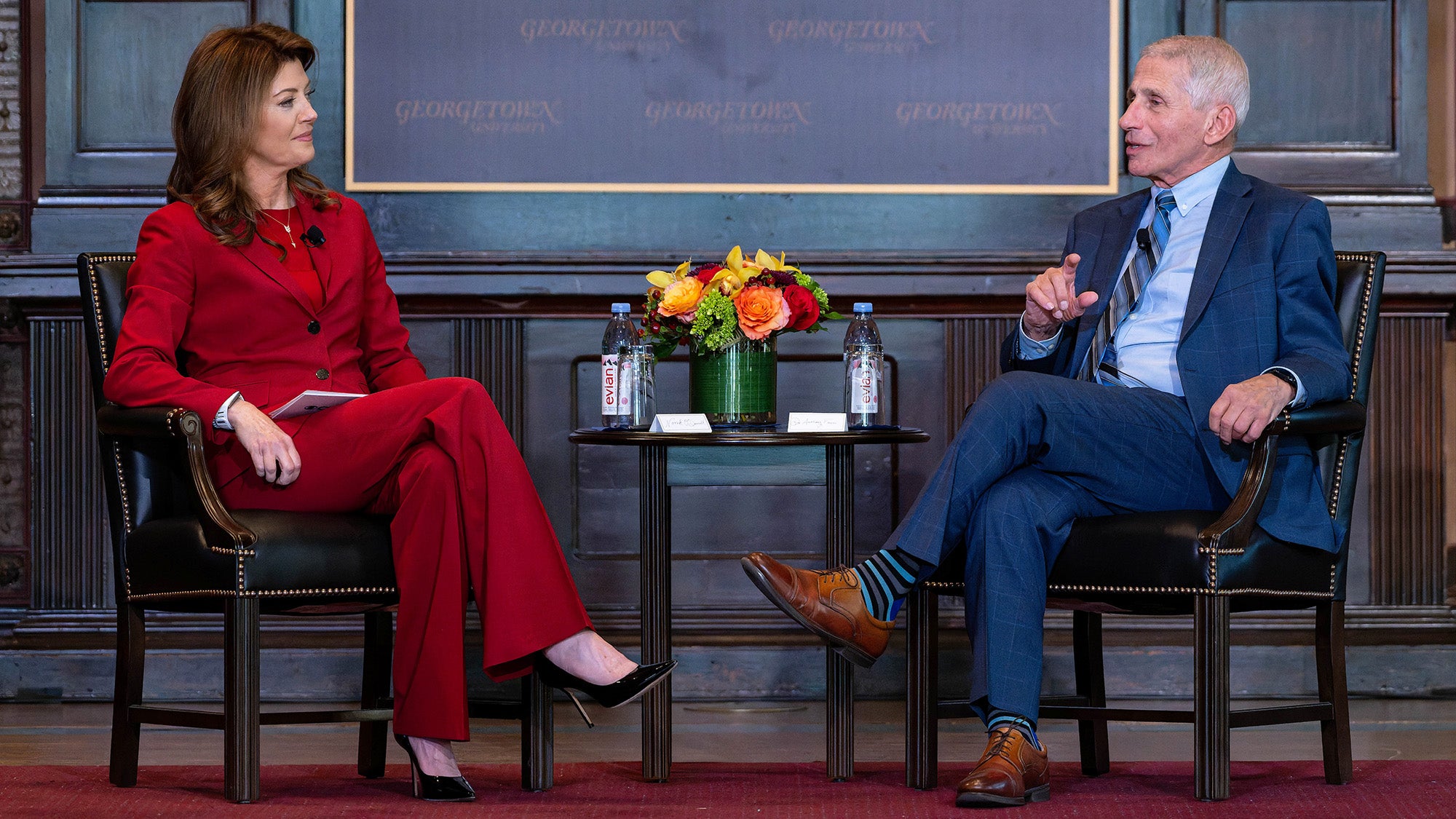
Posted in Lombardi Stories | Tagged cura personalis, Kovach Lecture, philanthropy
(November 12, 2025) — In a conversation with CBS News senior correspondent Norah O’Donnell (C’95, SCS’03, HON’24), Anthony Fauci, MD (HON’90), shared how his career has been guided by the value of cura personalis, care of the whole person.
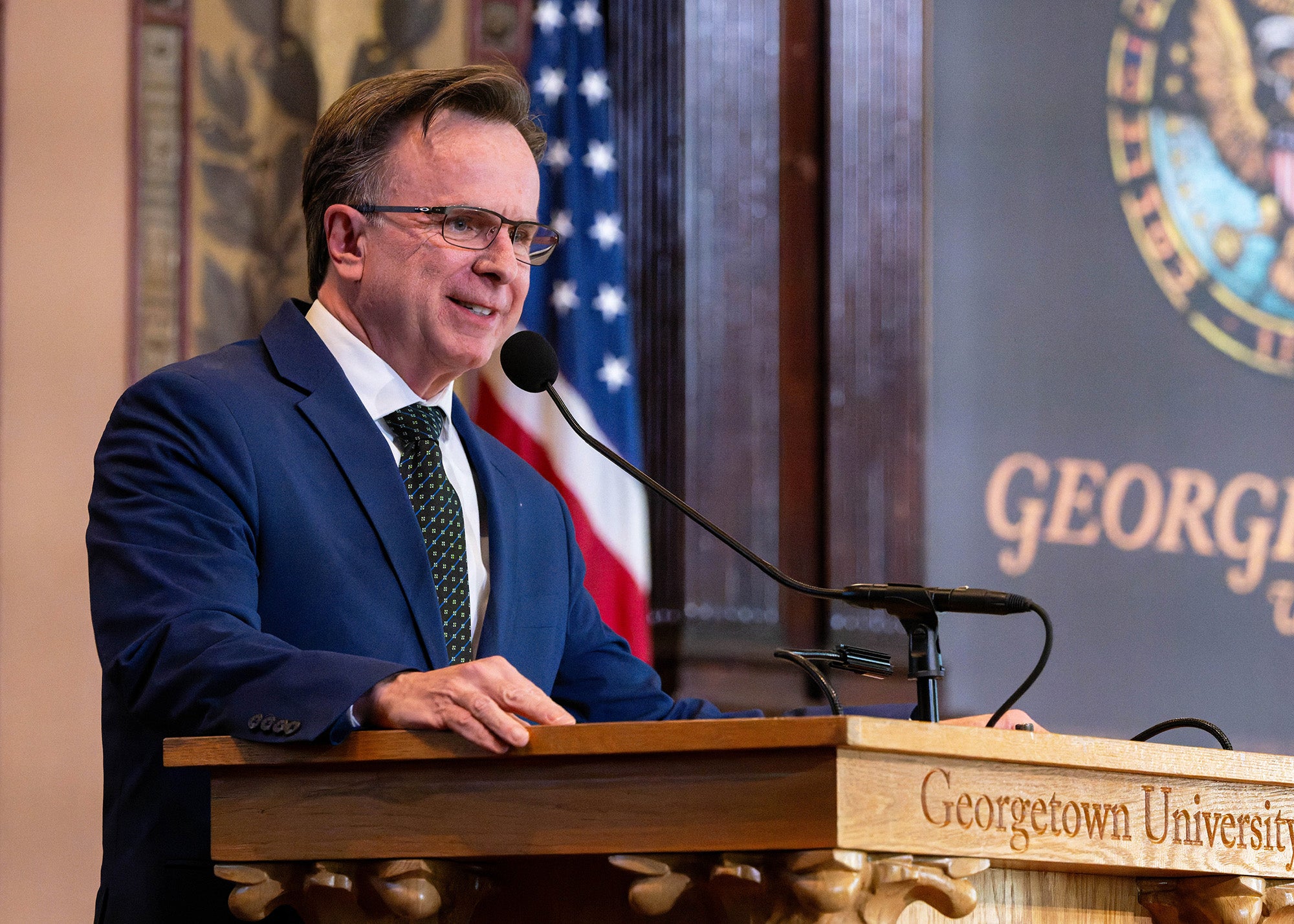
Fauci, Georgetown University Distinguished University Professor at the School of Medicine and the McCourt School of Public Policy, spoke with O’Donnell during the Edward M. Kovach Cura Personalis Endowed Lecture on October 23 in Gaston Hall. Norman J. Beauchamp Jr., MD, MHS, executive vice president for health sciences and executive dean of Georgetown’s School of Medicine, praised the Kovach family for drawing attention to the importance of cura personalis through the lecture.
“This lecture is built around the driving ethos of Georgetown,” Beauchamp said. “It’s what brought me here, which is that people shouldn’t be alone in their time of struggle, and cura personalis is all about that.”
Inspired by Cura Personalis
Kovach (C’57, L’60) earned his undergraduate and law degrees from Georgetown, served as an officer in the U.S. Coast Guard, and practiced labor law in San Francisco for several decades. He also met his wife of more than 50 years at Georgetown, and together they had five children.
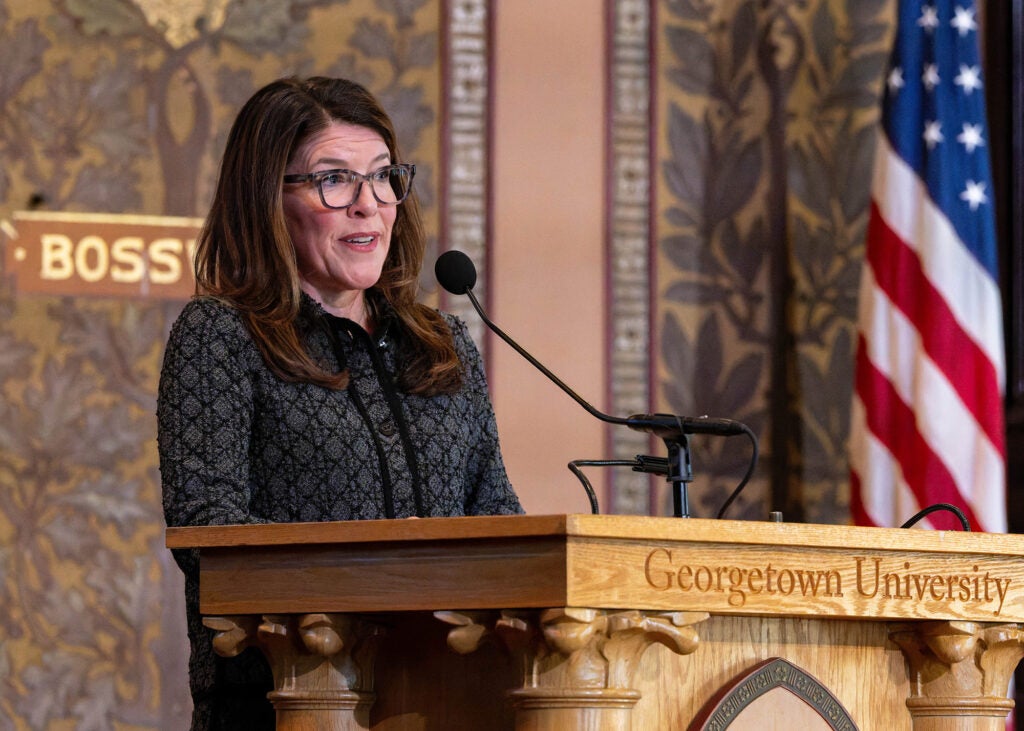
“He led an interesting, fulfilling and fortunate life, and he was appreciative of every moment,” said his daughter, Alexandra Kovach du Pont. “And then, in 2014, he finds himself back at Georgetown, diagnosed with Stage 4 pancreatic cancer.”
Throughout his treatment with John Marshall, MD, director of the Ruesch Center for the Cure of Gastrointestinal Cancers at Georgetown Lombardi, Kovach was treated as not just a patient but a whole person, Kovach du Pont said. Inspired by the care he received, they decided to create the Kovach Lecture.
“This beautiful concept of cura personalis, how we care for one another, patients and doctors in both directions, as full people listening to each other, asking questions, taking time to check in, these are the things that make a difference,” Kovach du Pont said.
Cura Personalis in Practice
As a child growing up in Brooklyn, New York, Fauci learned about the Jesuit value of cura personalis from his father, a neighborhood pharmacist. “He was not just a person who dispensed prescriptions, but he actually cared about the community,” Fauci said. “I sort of absorbed that as a child, as a 7-, 8-, 9-year-old person. And then my eight years of Jesuit training really solidified it.” Fauci attended Regis High School, a Jesuit school in New York City, and graduated from College of the Holy Cross, a Jesuit school in Worcester, Massachusetts.
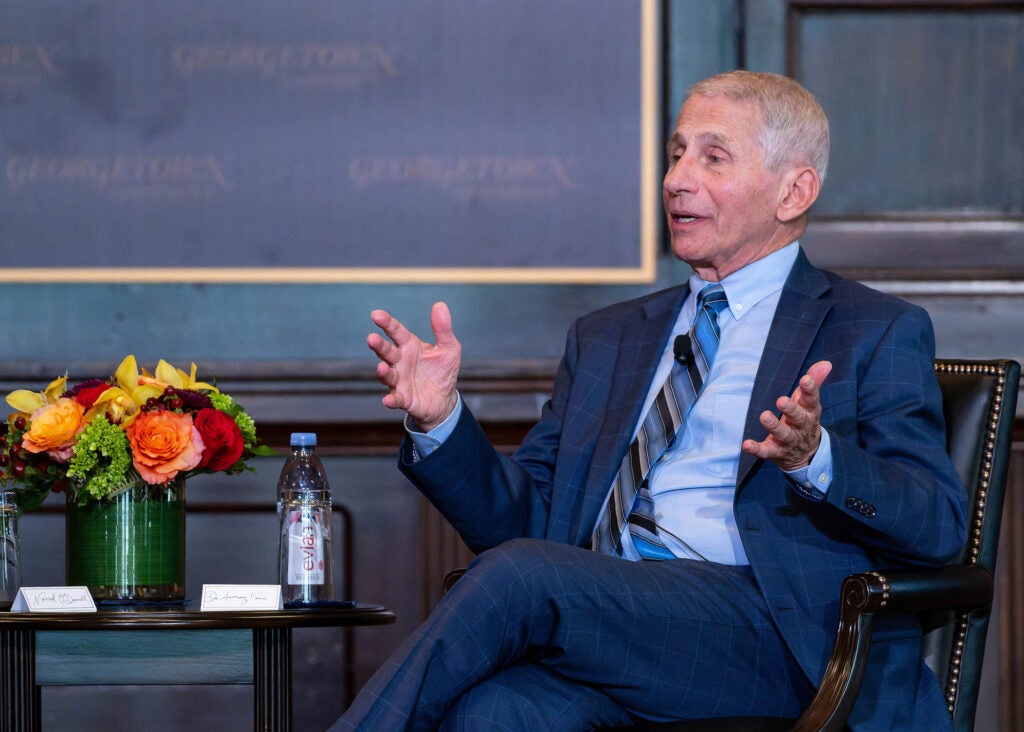
As an early-career physician, Fauci developed clinical protocols that had a positive impact on the lives of patients suffering from inflammatory disease.
“My experience at the NIH, when I came for a fellowship, introduced me to the world of biomedical research, where what you do not only is important for the individual patient who you yourself take care of, but it gets a multiplier effect, where a protocol or a discovery that you might make would amplify, and influence people who you might personally never take care of,” he said. “So that was the thing that essentially had me wanting to get involved in research.”
“I felt really good about the profession,” he added. “I was doing things that were saving lives. And then along comes HIV, and essentially every one of my patients for those early years died.”
Feeling a strong sense of empathy toward the patients with HIV he was seeing, who were mostly “young, terribly frightened gay men,” motivated Fauci to lean into cura personalis. “You’re trained as a healer and you realize for years in a row, you aren’t really truly healing anyone,” he said. “That’s where cura personalis really comes in.”
Pivoting to Policy
Recognizing the need for additional research on HIV, Fauci became director of the National Institute of Allergy and Infectious Disease (NIAID) in 1984. He served in that role for nearly 40 years.
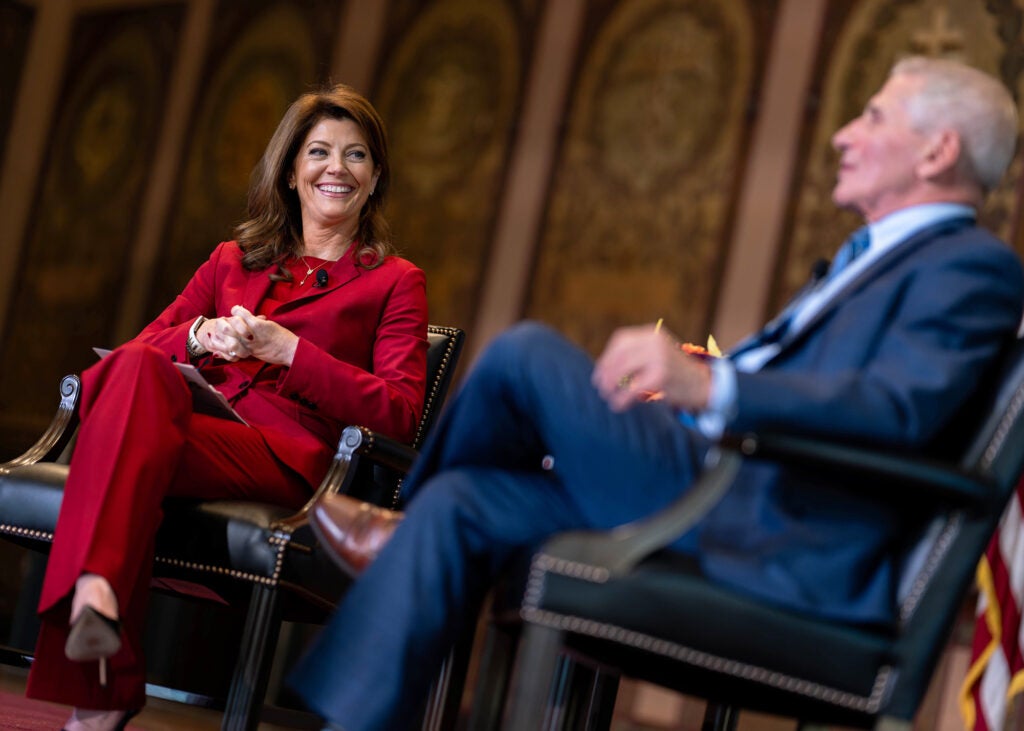
Fauci’s experience with HIV demonstrated the power of perseverance. “It taught me that if you stay at it and apply resources and apply effort, ultimately, you went from no therapy to one drug to two drugs to the combinations of drugs that we have right now,” he said. “So we went from the dark years of my medical career, when all I could do was comfort people, to now seeing people in clinic and just waving at them and making sure they take their medications.”
As new treatments for HIV made the virus easier to treat in the U.S., Fauci turned his attention to the developing world, where people didn’t have access to treatment. “I began to feel very pained that individuals who didn’t have access to therapy were suffering and dying with the disease that I was treating here in Bethesda, in Washington,” he said. “Fortunately, as I say all the time, President George W. Bush felt the same way that I did.”
Bush encouraged Fauci to create a plan to prevent and treat HIV infections in the developing world, leading to the establishment of the President’s Emergency Plan for AIDS Relief (PEPFAR), which has saved more than 25 million lives since it launched in 2003.
Though his scientific curiosity played a part in his dedication to preventing and treating HIV, Fauci’s dedication to cura personalis and caring for his patients as individuals kept him focused on his goal. “This was a challenge that I really could not walk away from,” he said.
Honoring a Commitment to Care
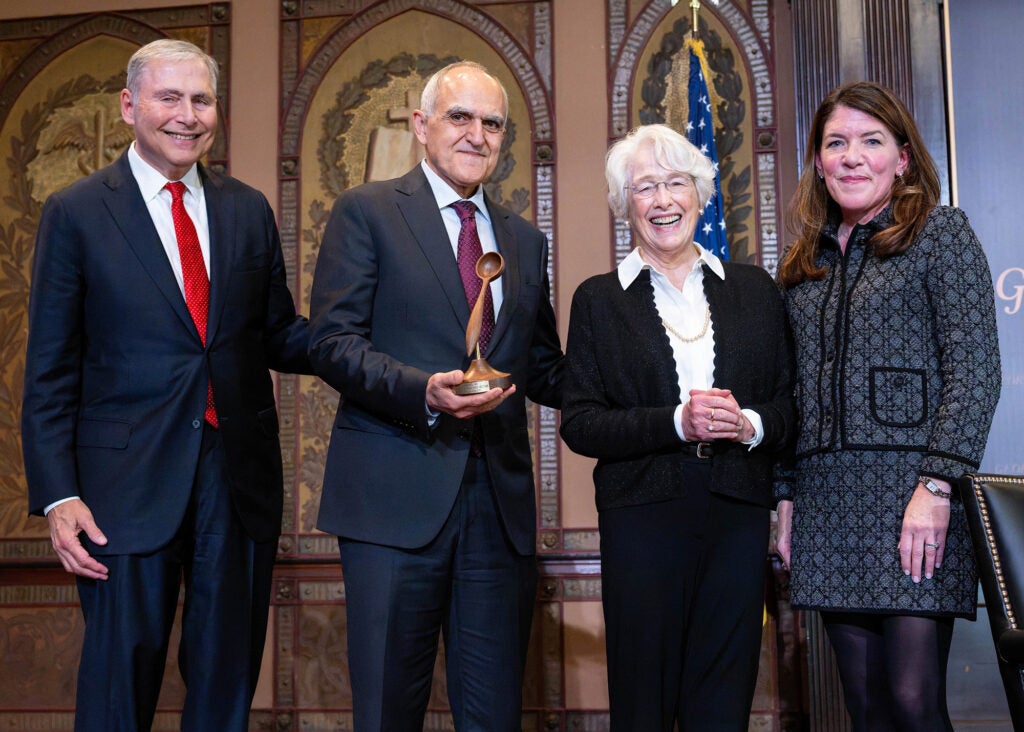
The Kovach Lecture also featured the presentation of the 2025 Wooden Spoon Award to Nadim Haddad, MD, vice president of medical operations and executive pillar chief, MedStar Health.
Kovach enjoyed woodworking and frequently gave handmade gifts to the people he cared about, including a hand-carved wooden spoon. In honor of “the beautiful, simple nod to caregiving and nourishment for both the body and the soul,” the Wooden Spoon Award honors those who care for patients in the spirit of cura personalis.
“Dr. Haddad, your medical expertise is unmatched, and yet well beyond the scientific,” Kovach du Pont said. “You are tasked with delivering good news and bad news with grace on a near daily basis, and always giving your patients a sense of hope, clarity and understanding. You are an incredible and proven steward of cura personalis, and for that, we thank you.”
Kat Zambon
GUMC Communications
